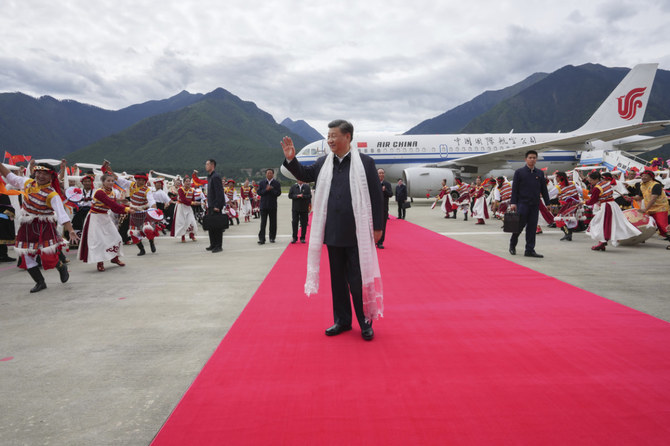The last time the Olympics came to China, he oversaw the whole endeavor. Now the Games are back, and this time Xi Jinping is running the entire nation.
The Chinese president, hosting a Winter Olympics beleaguered by complaints about human rights abuses, has upended tradition to restore strongman rule in China and tighten Communist Party control over the economy and society.
Xi was in charge of the 2008 Summer Olympics in Beijing that served as a “coming-out party” for China as an economic and political force. A second-generation member of the party elite, Xi became general secretary of the party in 2012. He took the ceremonial title of president the next year.
Xi spent his first five-year term atop the party making himself China’s strongest leader at least since Deng Xiaoping in the 1980s. Xi was dubbed “chairman of everything” after he put himself in charge of economic, propaganda and other major functions. That reversed a consensus for the ruling inner circle to avoid power struggles by sharing decision-making.
The party is crushing pro-democracy and other activism and tightening control over business and society. It has expanded surveillance of China’s 1.4 billion people and control of business, culture, education and religion. A “social credit” system tracks every person and company and punishes infractions from pollution to littering.
Xi’s rise coincides with increased assertiveness abroad following three decades of China keeping its head down to focus on economic development.
Xi wants China to be “the greatest country on Earth, widely admired and therefore followed,” said Steve Tsang, a Chinese politics specialist at the School of Oriental and African Studies in London.
“The world where China is top dog is a world where authoritarianism is safe,” Tsang said. Democracies will ”need to know their place.”
Born in Beijing in 1953, Xi enjoyed a privileged youth as the second son of Xi Zhongxun, a former vice premier and guerrilla commander in the civil war that brought Mao Zedong’s communist rebels to power in 1949. At 15, Xi Jinping was sent to rural Shaanxi province in 1969 as part of Mao’s campaign to have educated urban young people learn from peasants. Xi was caught trying to sneak back to the Chinese capital and returned to Shaanxi to dig irrigation ditches.
“Knives are sharpened on the stone. People are refined through hardship,” Xi told a Chinese magazine in 2001. “Whenever I later encountered trouble, I’d just think of how hard it had been to get things done back then and nothing would then seem difficult.”
Beijing is pushing for a bigger role in managing trade and global affairs to match its status as the second-biggest economy. It has antagonized Japan, India and other neighbors by trying to intimidate Taiwan — the island democracy that the ruling party says belongs to China — and by pressing claims to disputed sections of the South and East China Seas and the Himalayas.
The party has ended limits on foreign ownership in its auto industry and made other market-opening changes. But it has declared state-owned companies that dominate oil, banking and other industries the “core of the economy.”
Beijing is pressuring private sector successes such as Alibaba Group, the world’s biggest e-commerce company, to divert billions of dollars into nationalistic initiatives including making China a “technology power” and reducing reliance on the United States, Japan and other suppliers by developing processor chips and other products.
That, combined with US and European curbs on Chinese access to technology due to security fears, is fueling anxiety global industry might decouple or split into markets with incompatible auto, telecom and other products. That would raise costs and slow innovation.
Xi, 68, looks certain to break with tradition again by pursuing a third term as party leader at a congress in October or November. He had the constitution’s limit of two terms on his presidency repealed in 2018. That reversed arrangements put in place in the 1990s for party factions to share decision-making and hand over power to younger leaders once every decade.
Even before Xi took power, party officials complained that group leadership was too cumbersome and allowed lower-level leaders to ignore or obstruct initiatives. Officials defend Xi’s efforts to stay in power by saying he needs to ensure reforms are carried out.
Xi led an anti-corruption crackdown whose most prominent targets were members of other factions or supported rival leadership candidates. The campaign was popular with the public but led to complaints that officials refused to make big decisions for fear of attracting attention.
Xi has called for a “national rejuvenation” based on tighter party control over education, culture and religion. Many of the changes are hostile to ethnic minorities, gays and lesbians, pro-democracy and other activists and independent-minded artists and writers. Social med

